Background
Simonton, Dean Keith was born on January 27, 1948 in Glendale, California, United States. Son of Dean Clarence Simonton and Laverne (Merkobrad) Williams.


(Is there a scientific way to assess the validity of gener...)
Is there a scientific way to assess the validity of generalizations about historical events? Can we test psychological hypotheses about human behavior? In this book the author describes how the emerging field of historiometry provides such tests by applying quantitative analyses to historical data about representative people and events. The author presents an overview of historiometry, explaining how it is practised and how useful it can be to historians, psychologists, and other social scientists. He discusses the methodology of historiometry - formulating the basic questions of a study, deciding what information is necessary, and analyzing the information so as to assess the original hypothesis. He then shows how historiometry has expanded our scientific understanding of such key phenomena as genius, creativity, leadership, and aggression. By scrutinizing the personal papers, biographies, and creative output of historical figures ranging from composers, writers, and scientists to American presidents, European monarchs, and generals, practitioners of historiometry can illuminate many variables affecting human personality and achievement. Throughout the book, Simonton provides examples of the way that historiometry offers insights into such areas as the degree to which attitudes toward politicians are influenced by specific persuasion techniques, the effect of economic and political conditions on the authoritarian personality, and the impact of genetic endowment, birth order, family background, and formal education on personality development.
http://www.amazon.com/gp/product/0300047711/?tag=2022091-20

(Dean Keith Simonton examines uncommon people; those creat...)
Dean Keith Simonton examines uncommon people; those creators and leaders whose impact on their own and later times has been so great that they deserve the label "genius." A simultaneous look at creativity and leadership is itself uncommon, and the comparison shows that when creators and leaders act at genius levels they have many similarities. What it is that causes them to stand out above others? Is it family background, education, intelligence, the nature of the times in which they live? Is there a peak age for creativity? Simonton believes that if we subject the lives of the eminent to scientific analysis we may be able to discover general laws of history and social behavior. To do this he defines a discipline called historiometry. He begins with an explanation of the method: choosing a unit of analysis, be it individual philosophers, historic land battles, or classical melodies; defining and calculating the crucial variables; and teasing out with advanced statistical analysis the most probable causal connections in the data.
http://www.amazon.com/gp/product/1583484388/?tag=2022091-20
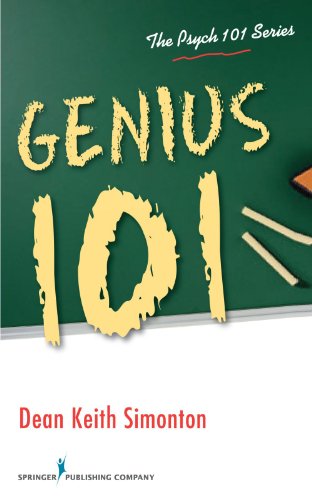
( "Genius 101 makes for a great read on a centuries-old s...)
"Genius 101 makes for a great read on a centuries-old scientific puzzle - as well as a lively text on the wellsprings and manifestations of genius." Teresa M. Amabile, PhD The Edsel Bryant Ford Professor of Business Administration Harvard Business School A clear and engaging summary of this mysterious and utterly important phenomenon written by arguably the world's expert on the topic. Nearly 30 years of Simonton's fascination and focused intellect on the topic of exemplary genius come together in this brief, accessible and insightful volume. If only all introductory courses were this much fun! --Gregory J. Feist, PhD San Jose State University "The latest, and possibly most comprehensive, entry into this genre on the study of genius is Dean Keith Simonton's new book Genius 101... Simonton, a psychology professor at the University of California, Davis, is one of the world's leading authorities on the intellectually eminent..." --Time Magazine, February 13, 2009 "Genius 101 is an extremely readable and entertaining book: I read it in one sitting....Each chapter is informative, well organized, provocative, and entertaining. This book presents the best short introduction to genius to be found." --Robert Sternberg PsycCritiques • Are geniuses born or made? • How do psychologists measure "genius"? • Is it "genius," or is it "madness"? "Genius," contrary to common belief, is not strictly a matter of intelligence. Intellect, personality, creativity, even serendipity play a significant role in molding a genius. So, what does it mean to be a genius? Genius 101 examines the many definitions of "genius," and the multiple domains in which it appears, including art, science, music, business, literature, and the media. Dr. Simonton introduces the study of genius theory and the research supporting it, using non-scientific, accessible language-fit for a non-genius. The Psych 101 Series Short, reader-friendly introductions to cutting-edge topics in psychology. With key concepts, controversial topics, and fascinating accounts of up-to-the-minute research, The Psych 101 Series is a valuable resource for all students of psychology and anyone interested in the field.
http://www.amazon.com/gp/product/0826106277/?tag=2022091-20
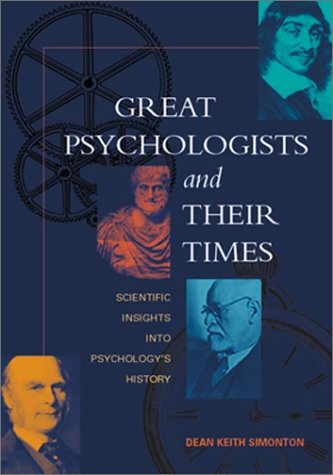
(Great Psychologists and Their Times is the first comprehe...)
Great Psychologists and Their Times is the first comprehensive compilation of research on the factors that contribute to great psychologists' impact on the discipline. The author examines those individuals who have contributed most to the advancement of psychological science from a scientific perspective -- especially from the standpoint of psychological science. The book integrates all of the relevant research on the psychology of eminent psychologists, from the pioneering work of Francis Galton to work published in the 21st century. Chapters are rich in examples drawn from the lives and careers of notable psychologists, examining such issues as birth order, psychopathology, and intellectual precocity. Of particular interest are chapters exploring what aspects of the sociocultural context are most conducive to the emergence of illustrious psychologists and how these sociocultural conditions -- including political events, economic disturbances, or cultural values -- affect not only the magnitude of achievement but also the very nature of that achievement. The findings reviewed lead to suggestions about how best to educate and train both undergraduate psychology majors and graduate students in psychology. This book will be a useful resource for all psychologists, scientists, and historians who are willing to ponder the provocative overlap between psychology, science, and history.
http://www.amazon.com/gp/product/155798896X/?tag=2022091-20
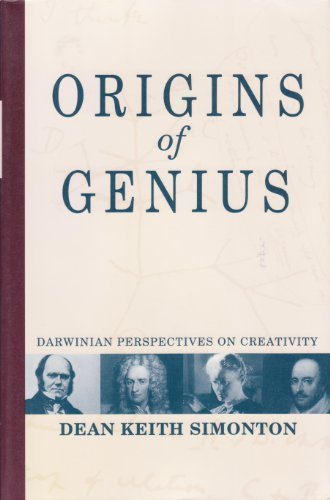
("Civilizations are often defined by the lives and works o...)
"Civilizations are often defined by the lives and works of their creative geniuses. The glory that was ancient Greece was built on the achievement of Homer, Pythagoras, Herodotus, Sophocles, Plato, Hippocrates, Phidias, and hundreds of other great creators. Modern European civilization was illiuminated by the likes of Galileo, Descartes, Tolstoy, Rembrandt, and Mozart. The same story may be told of the world's other civilizations. The histories of Persia, India, China, and other high cultures are to a very large extent chronologically arranged biographies of notable creative minds. As Thomas Carlyle proclaimed in his famous 1841 essay On Heroes, 'Universal History, the history of what man has accomplished in this world, is at bottom the History of the Great Men who have worked here.' Among those he discussed at length as illustrations were Dante and Shakespeare, two of the greatest writers in any language. So obvious is the debt civilizations owe these exceptional individuals that the appearance of such geniuses is often considered an indication of the creative health of a civilized culture. For example, this linking is evident in the 1944 Configurations of Culture Growth by Alfred Kroeber, an eminent cultural anthropologist. Wishing to gauge the emergence, growth, and stagnation of civilizations throughout the world, Kroeber could conceive of no better method than to assess the appearance of famous creators across a culture's history. A civilization enjoyed a golden age when it overflowed with first-rate creative minds, experienced a silver age when the creative activity descended to a less notable level, and suffered a dark age when creators became few and far between. Indeed, this association goes beyond the abstract operational definitions of behavioral scientists. What nation does not take pride when one of its writers or scientists is awarded the Nobel Prize?"
http://www.amazon.com/gp/product/0965005267/?tag=2022091-20
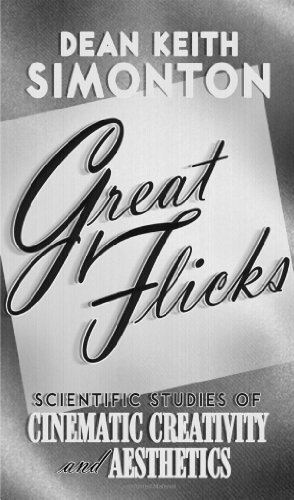
(What does it take to make a great motion picture? What do...)
What does it take to make a great motion picture? What do we even mean by cinematic greatness? What is more important: movie awards, critical acclaim, or box office success? Who has the biggest impact: the writer, the director, or the actors? Scientific research has provided some provocative answers. This review of cinematic creativity and aesthetics is confined to scientific studies carried out by a multidisciplinary group of researchers. Do great films receive both shiny trophies and five stars? Chapter 2 concentrates on movie awards, including the Oscars and Golden Globes, and how those awards relate to critical acclaim. How do the dramatic awards compare with the visual, technical, and music awards? Chapter 3 studies more closely how these awards cluster together and which of these clusters best predict cinematic success. How does box office compare with critical evaluations and movie awards? Chapter 4 adds a new consideration, namely the film's financial performance. The following four chapters focus on specific contributions to a film's impact: Chapter 5 covers the script (including writers), Chapter 6 the director (or "auteur"), Chapter 7 the actors (especially gender differences), and Chapter 8 the music (both scores and songs). Chapter 9 addresses the question of whether the same cinematic factors that make some films great also make other films bad: Are bombs the exact opposite of masterpieces? The book closes with an epilogue on future directions in scientific studies of cinematic creativity and aesthetics. What do researchers need to do if we want a complete understanding of what it takes to create a powerful cinematic experience? This volume will be invaluable to anyone interested in film, including any aficionado who is open to a scientific approach, and researchers in the areas of creativity, aesthetics, and cultural economics. The reported research comes from many disciplines, including psychology, sociology, economics, management, marketing, communications, journalism, broadcasting, history, musicology, and statistics.
http://www.amazon.com/gp/product/0199752036/?tag=2022091-20
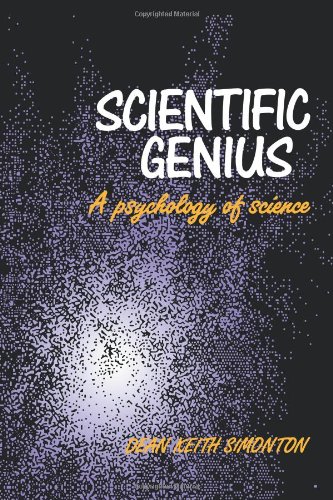
(Dean Keith Simonton developed a theory of scientific geni...)
Dean Keith Simonton developed a theory of scientific genius called chance-configuration theory that accounts for mental processes and behaviors behind the creative act, including intuition, incubation, and serendipity as well as the cognitive and motivational styles of great scientists in terms of a personality typology. Simonton examines the causes and consequences of exceptional productivity: individual differences in lifetime output, the functional relation between age and achievement, the probabilistic connection between quantity and quality, and such issues as the Ortega hypothesis, the Yuasa phenomenon, and Planck's principle. Other factors that he examines are family background, education, role models, marginality, and the zeitgeist. A concluding chapter outlines the broader implications of the theory for the measurement and encouragement of genius in science, and places it in the context of the alternative metasciences - the philosophy, sociology, and psychology of science. Simonton's provocative ideas are a major impetus to true psychology of science and will interest a broad audience.
http://www.amazon.com/gp/product/0521117135/?tag=2022091-20
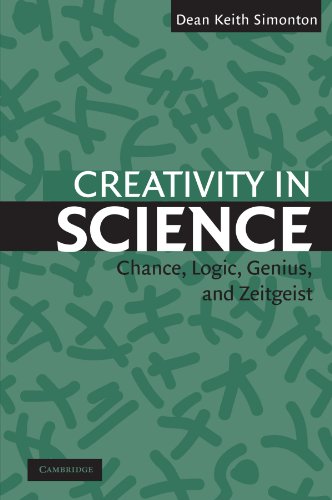
(Where do major scientific breakthroughs come from? Do the...)
Where do major scientific breakthroughs come from? Do they arise from the logic of the scientific method, or do they result from flashes of genius? Are they the products of some mysterious zeitgeist, or spirit of the times, or do they emerge from chance or serendipity? Dean Simonton provides an answer, not by choosing one explanation and ignoring the others, but rather by unifying all four perspectives into a single theory in which chance plays the primary role, but with the significant involvement of logic, genius and zeitgeist.
http://www.amazon.com/gp/product/052154369X/?tag=2022091-20
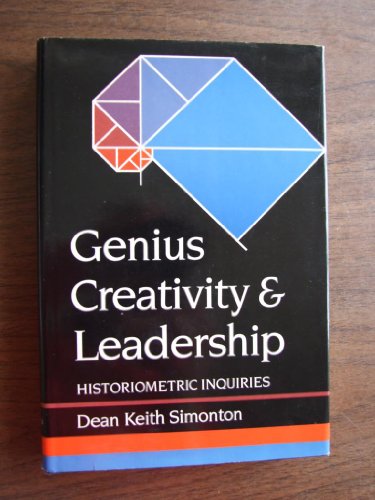
(Dean Keith Simonton examines uncommon people; those creat...)
Dean Keith Simonton examines uncommon people; those creators and leaders whose impact on their own and later times has been so great that they deserve the label "genius".
http://www.amazon.com/gp/product/0674346807/?tag=2022091-20
Simonton, Dean Keith was born on January 27, 1948 in Glendale, California, United States. Son of Dean Clarence Simonton and Laverne (Merkobrad) Williams.
Bachelor in Psychology magna cum laude, Occidental College, 1970. Master of Arts in Social Psychology, Harvard University, 1973. Doctor of Philosophy with distinction, Harvard University, 1975.
Assistant professor psychology University Arkansas, Fayetteville, 1974-1976. From assistant professor to professor University California, Davis, 1976—2004, distinguished professor, since 2004. Consultant Wissenschaftzentrun, Berlin, 1979, Center for Creative Leadership, Greensboro, North Carolina, 1983, North Atlantic Treaty Organization, Brussels, Belgium, 1980-1981, Department Defense, Washington, 1983, Creative Problem Solving Institute, 1984, Arvin Perlmutter, Inc., 1992, Milken Family Foundation, 1994, Templeton Foundation, 2002.
(Where do major scientific breakthroughs come from? Do the...)
(Is there a scientific way to assess the validity of gener...)
(Dean Keith Simonton developed a theory of scientific geni...)
(What does it take to make a great motion picture? What do...)
(Dean Keith Simonton examines uncommon people; those creat...)
(Dean Keith Simonton examines uncommon people; those creat...)
(Great Psychologists and Their Times is the first comprehe...)
( "Genius 101 makes for a great read on a centuries-old s...)
("Civilizations are often defined by the lives and works o...)
(1)
Fellow American Association for the Advancement of Science, American Psychological Society, American Association Applied and Preventive Psychology, American Psychological Association (member-at-large 1979-1982, president psychology and the arts division 1985-1986, Rudolf Arnheim award Outstanding Contribution to Psychology and the Arts, 1996, George A. Miller award 1997, William James Book award, 2000, Robert S. Daniel Four Year College/University Teaching award, 2006, matter lecturer, 2009, president-elect, general psychology division since 2010). Member Phi Beta Kappa, Sigma Xi.
Married Susan Youel, June 21, 1971 (divorced 1982). Married Melody Boyer, December 29, 1984 (divorced 2004). Married Karen Horobin, March 20, 2005.
